

Here we are again! The cover is what happens when Kate's late-night mental hamsters decide to lend a hand... If you can't follow all of the connections, well, that's probably just as well.
A year, a year, what a year it's been! Plans for a kitchen remodel sucked up all available brain cells for a few months. We've been to Madison, Milwaukee, Minneapolis, Phoenix, and France. Kate went to a knitting convention in Oakland; David square danced nekkid in Palm Springs. McAfee likes David's UI work enough that they're adding a small department of people to do more like it. Kate knit some beaded Space Babe wristlets for auction at Wiscon and had the thrill of hearing Jane Yolen bid on them. She's entered a hat at the State Fair and will find out whether it's won a ribbon after this goes to press.
And speaking of thrills, David's story "The Tale of the Golden Eagle" (F&SF, June 2003) has taken off like a rocket. Strahan/Haber SF: Best of 2003, Nebula preliminary ballot, Sturgeon Award finalist, freakin' Hugo nomination!! The Israeli SF website that published a translation of it sent us a print of the artwork they commissioned for it. She's beautiful.
If you're getting two of these at once, it's because we were lazy buggers and never mailed overseas copies of #15. Complaints, comments, contributions and chocolate to: David Levine and Kate Yule, 1905 SE 43rd Avenue, Portland, Oregon 97215... email David@BentoPress.com, Kate@BentoPress.com... more info, especially about David's writing, at www.BentoPress.com.
This happened last March, when four of our five county commissioners (all women, as it happens, leaving the lone man on the board out of their planning and dodging the county's open-meetings law by holding all discussions in groups of two) consulted with the county's lawyer and determined that the state's restrictions on who could marry whom violated the state Constitution. Following their oaths of office, they acted to uphold that Constitution and began granting marriage licenses to same-sex couples.
My route to work goes right past the office building where marriage licenses are issued. Usually this minor government function attracts little attention, but for seven weeks in March and April there were lines around the block all day—hundreds of same-sex couples, supporters gay and straight, some protesters, and oh yeah, some straight couples, too. I would honk and wave as I drove by. Some of my friends brought flowers, and bagels, and coffee...and umbrellas.
March is the rainy season in Portland (as are November through February). These people were standing for hours in the rain for a marriage license—a piece of paper that did nothing more than promise official recognition of a relationship to which these people had already devoted a major chunk of their lives. (I'm not aware of any same-sex couples who'd just met that week and decided to tie the knot on impulse.) Many of them had traveled great distances, spent money they couldn't really spare, or taken unpaid leave from work to be there.
What made a marriage license worth all that? Not the tax breaks—the federal so-called Defense of Marriage Act means that same-sex marriages won't make any difference at all on the Form 1040 that is the biggest hunk of most people's tax bill. Not the insurance—many Oregon employers already offer coverage to same-sex domestic partners, and many of those that don't could be counted on to fight covering same-sex spouses. Not custody of children, or visitation in the hospital, or inheritance of property—although perhaps all of those things together. Approximating all of marriage's benefits through other legal arrangements is a tedious business.
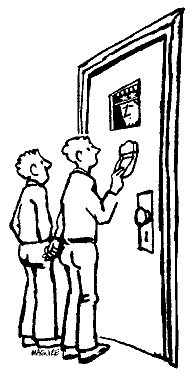
In any case, everyone knew there was a good chance the licenses wouldn't hold up in court. Right-wing activists were trying to stop these marriages from the moment they were announced, and would surely keep up the fight all the way to the Supreme Court. And even if the Oregon Constitution really was on the side of marriage equality—even those sympathetic to the cause were of mixed opinions on this point—the county commissioners' dead-of-night process ensured that the decision would be questioned on procedural grounds. This was civil disobedience on a grand scale, and like any other form of civil disobedience it carried a high risk of failure.
So why did they do it? Love, that's why—love that conquers all, love that's a bitch, love that makes the world go 'round. The same thing that makes anyone else want to stand up in front of God and everyone and say "I'm with Stupid." Love is a bird that flies on wings of hope even when skies are gray. It isn't rational.
The arguments on the other side aren't rational either. "Marriage is for the protection of children"—so why do we allow infertile straight couples to marry? And wouldn't two parents of whichever sex be better than only one? "Marriage has always been between one man and one woman"—aye, and they used to say "we've always had slavery" and "we've always burned witches at the stake," too. Times change. "Homosexuality is prohibited by the Bible"—so are eating shellfish and wearing linsey-woolsey. In any case, implicit in the First Amendment is that no religion gets to determine what is and is not legal. "Same-sex marriage threatens traditional marriage"—this one I simply don't understand. The rationale seems to be that homosexuality is so attractive that if prohibitions against it were relaxed, thousands would abandon their spouses and children for a long walk on the wild side. I don't see it happening, somehow.
And so, with huge steaming piles of irrationality on either side, is it any wonder that people are all het up (pardon the expression) about this issue? It's an enormous hot button for both major parties; the Republicans use it to froth up their base, and it's a major "wedge issue" for the Democrats because it makes so many people uncomfortable.
It comes down to that. The "gay marriage" issue makes the majority of Americans uncomfortable. They'd rather not think about it, and if push comes to shove they'll just mutter "well, no, actually, I'd rather not." They don't mean anyone any ill, but a tradition's a tradition, you know? And so every dramatic step forward for same-sex marriage in Hawaii or Vermont or Massachusetts or San Francisco or Multnomah County is soon countered by the low thundering sound of a million uncomfortable heterosexuals taking a tiny shuffle backward.
As I write this, same-sex marriage has been temporarily or permanently halted in every state where it's been tried except Massachusetts, and the governor there is trying to choke it off through rigid interpretation of a law originally intended to block interracial marriages. And to prevent the courts from invoking their state Constitutions, most of the states have added a little "equal protection under the law...except for some people who want to marry the person they love best" codicil. About a dozen of the rest, including Oregon, are going to try to add one of those this November, and I can already hear the rumble of the great shuffle backward from here.
It makes me mad as hell.
This has nothing to do with sex, though that's what has the right wing all up in arms about it. It's about whether the majority will be allowed to determine the legal rights of a minority.
The reason we have a Constitution and a judicial branch, instead of just a legislative branch, is to prevent a majority of people from getting together and deciding that some unpopular minority doesn't get to play any more. Changing the Constitution to explicitly lock a particular unpopular minority away from that protection is exactly the wrong thing to do. It's an abuse of the system, it's mean-spirited, and it's wrong.
If you're straight, it would be easy to take that one little shuffling step backward. Don't do it. Face your own discomfort and support the rights of your friends, your neighbors, your hairstylist and your barista and your dentist—vote this ridiculous Constitutional amendment down. Because if you don't... you never can tell who gets thrown off the team next. It might be you.
—DDL
—KY

I didn't know this before we started to plan a remodel. There's flooring to choose, cabinets, backsplash material, countertops—and every individual decision, while it does channel things in a particular direction, opens up a door behind which lurks a whole 'nother tree of decisions.
Our particular kitchen is fractal and orange. All the countertops, the backsplash (British, "splashback")—orange. We figure it dates from sometime in the Nixon administration. The cabinets are mostly functional. I mean, we went ten years without particularly noticing that the person standing at the wok gets whacked in the head whenever the other cook gets into the spice cupboard. But getting in and out of the kitchen is much harder than it should be for any room with four doors. There's a reflexive hip-shimmy as you come in from the dining room and immediately duck right to avoid the countertop corner. Across the room, our fridge is just a leeetle bit bigger than the previous owners', so to go outside or upstairs requires shoving the cutting board closed, turning sideways, and holding one's breath. There's 15 inches clearance.
We have a lovely back yard. The glass in the back door (once you get to it) is the only window facing it on the main floor.
The drainboard doesn't.
Our floor is a marvel. Spilled cereal, carrot slices, loose grapes and dropped cutlery vanish instantly on the amazing Camo-Vinyl! Shoot, you could drop an entire potato salad on this stuff and never find it again... by eye.
The crowning feature of this kitchen, though, has got to be the Formica. When we bought the house we said "Of course the counters are awful, but we can replace them." What I was forgetting is that my family has never remodeled or redecorated. Ever.
OK, slight exaggeration. Once upon a time when my brother moved into the basement and Sue moved over into his bedroom, we changed the wallpaper. Mom redid the bathroom when we sold that house. And the crumbly purplish-pinkish cinderblock in my next bedroom did eventually get a coat or three of white paint.
But the ranch-style house my folks bought in 1975, from the original owners, still has the original curtains. And stove. So what if the colored indicators on the burner controls are all faded or broken? We know which buttons do which, right? It's not that my family's against redecorating. We just have other things to do!
So eleven years after David and I moved in here, it dawned on me that (a) those countertops were still orange and (b) they had no intention of changing on their own anytime soon. Oh.
We kicked off the process by attending a Free Seminar given by a firm of design/build contractors here in town. Every few months Neil Kelly Company spends a Saturday talking about kitchen and bathroom remodels to roomfuls of Portlanders, and trolling for sales prospects. We asked for a follow-up appointment and were quite pleased with the two designers we met with. One has been with the company for twenty or thirty years; she knows her workmen; she knows the design and construction issues that come up in these houses, this city, this vintage. I like that Neil Kelly Company has been in this business for almost sixty years. They aren't going to flake out on us, go bankrupt, fail to pay their suppliers, put us on hold while they take care of their brother-in- law's basement. They seemed very clear that the planning process would take however long we needed it to take.
About three months, as it turns out. Here's what we hashed out.
Countertops: Slatescape. It's a kind of concrete, a faux-slate that's widely used in school science labs. Warmer and softer than granite, harder and more natural-looking than Corian. You can't cut on it, but what can you, apart from butcher block? Using a knife on any surface is inevitably destructive to surface, knife, or both. Properly sealed, the Slatescape should need oiling every few months and professional resurfacing a decade from now. Sounds like our kind of timing. The example that convinced us, in a demo kitchen at NKC, is pictured at www.ecohaus.com/pop_slatescape_img.html. Oh, and I'll have about a square yard of green granite at the right height for kneading dough, with a shallow groove at one side to catch the rolling pin.
Floor: Linoleum. The real thing: made from linseed oil, rosin, finely ground limestone, and cork and wood "flour" on a jute backing. No dead dinosaurs here! We also like the way it can take a decorative inlay. We saw a great inlaid iguana in a newspaper article, and Forbo has some cool pre-made borders. We settled for a simple green rectangle with lilac accents, on a neutral background that won't show all the dirt.
Cabinets: An unfussy Mission or Craftsman style from Neil Kelly, with certified wood and environmentally friendly glues etc. Alder, with a dark cherry glaze. The devil was in getting all the details to play nicely together: That cabinet can't be 27" if you get that sink because there isn't room. You can have the lazy susan if you choose this brand of cabinet, or the knife rack with this other line. The door has to open this way or it'll hit the stove hood. And so on. We have a "base susan with attached doors" (i.e. kick the corner cupboard door and it rotates out of the way); I had to pitch four kinds of fit to get our "custom cabinets" to retain that feature. It was the darning egg all over again: "Oh, nobody wants it like that any more." Hah!
Sink: The big splurge. A handmade two-bowl Shaw's Original Fireclay Sink, the Rohl RC 3620. We didn't know about this style existed until we started our kitchen research, but having seen them, we were in love! (Variously also called a farmhouse, apronfront, French, or Belfast sink. Cubertou's kitchen had one—as it happens.) See www.rohlhome.com. To go with it, a wall-mounted faucet with old-style ceramic handles that say "hot" and "cold" and an interesting arch to the spout.
Tile backsplash: My favored decision-making method, I've come to realize, is to identify all the options, then sort through them to find the optimal solution. This method has its limitations; for instance when dealing with an infinite number of good backsplash designs (and an even larger infinity of bad ones. Isn't mathematics fun!) There are many, many really keen and beautiful tiles being produced out there. The tube-lined Art Nouveau styles, very tempting, were generally too big for us at 6x6 inches (see www.tiledecorative.com, or www.motawi.com). We're going to be fairly restrained: a field of off-white subway tile, with an accent row of 2x2s in green, gold, and purple—think pansies, or crocuses. The green ones, from Feature Tile, have subtle geometric designs stamped into them.
Stove, refrigerator, dishwasher, microwave: All perfectly usable as they are, thank ghu! Just moving them around, to put dishwasher & dish storage closer to the dining room, and open the view to the backyard. The stove's going on an outside wall, so we can add a ventilation hood. Very handy for cooks whose repertoire includes Nerve Gas Chicken.
Etc.: Door: lots more glass, with muntins. Or mullions. Scullions. Something, anyway. Lights: from Rejuvenation, of course! (Hometown experts.) Cabinet hardware: um, haven't picked that yet. Demolition date: the day after we get home from Worldcon. Projected time without a kitchen: 8 weeks. Anxiety level: orange.
—KY
The wombats wanted a little more elbow room.
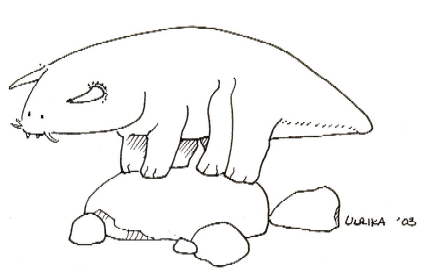
We hold these truths to be self-evident, that all people are created equal, that they are endowed with certain unalienable Rights, that among these are Life, Liberty and the pursuit of Happiness.—That to secure these rights, Governments are instituted among People, deriving their just powers from the consent of the governed,—That whenever any President becomes destructive of these ends, it is the Right of the People to remove him, and to institute a new President, one who shall seem most likely to effect their Safety and Happiness. Prudence, indeed, will dictate that Presidents once established should not be changed for light and transient causes; and accordingly all experience hath shewn, that mankind are more disposed to suffer, while evils are sufferable, than to right themselves by replacing Presidents to which they are accustomed. But when a long train of abuses and usurpations, pursuing invariably the same Object evinces a design to reduce them under absolute Despotism, it is their right, it is their duty, to throw off such a President, and to provide new Guards for their future security.—Such has been the patient sufferance of the American People; and such is now the necessity which constrains them to remove their current President. The history of the present President of the United States is a history of repeated injuries and usurpations, all having in direct object the establishment of an absolute Tyranny over these States. To prove this, let Facts be submitted to a candid world.
We, therefore, the People of the united States of America, do solemnly publish and declare, That these United States are, and of Right ought to be Free and untrammeled by Oppression; that they are Absolved from all Allegiance to the present President, and that all political connection between them and this Administration, is and ought to be totally dissolved; and that as a Free and Independent People, they have full Power to oppose and indeed replace the present Government, without question of their allegiance to these States. And for the support of this Declaration, with a firm reliance on the protection of the rule of Law, we mutually pledge to each other our Lives, our Fortunes and our sacred Votes.

American potato salad is typically mayonnaise-based. It has crunchy bits of celery or pickle and holds its shape when scooped out onto a plate. "German" potato salad, both in American recipes and in all the German ones I've found so far, is lighter, looser, vinegar-based, often with onion and bacon fat.
Ah, but Münchner Kartoffelsalat is neither of these... a little vinegary, a little creamy, it's yellow and pools on the plate like very chunky applesauce. You get it with herring at the Nordsee fast-food place next to the produce market, and with Wurst and a roll at the little hot-dog stalls down in the subway stations. David theorizes that an essential part of its creation is the repeated stirring and scooping after it is shipped across town in 55-gallon drums. I hope not. If that's it, I'll never manage to duplicate it at home.
Also yearn-worthy: the Käseschnitzel at that little place on the tram line, just past the Chevron station. For—5 Marks? 5 dollars? less than any other reasonable dinner, certainly—you got a veal cutlet that hung over the sides of the plate, a mound of Spätzle noodles, and gravy if you knew to ask for it. And a pint of beer. Covering one side of the veal before it was breaded and fried was a thin layer of cheese. Ohhhhhh, crispy wonderfulness. We would go in a party of six or seven, and order six or seven Käseschnitzel every time. When David and I went back in 1987, it had become a Greek restaurant [sigh].
While I was there, of course, I yearned for other things. Peanut butter. Toast. The bread was delicious, and available fresh from a shop in the neighboring dorm. German households may have had toasters. I wouldn't know. I was trying to learn to cook for myself with one cupboard and half a refrigerator shelf to call my own, and a crazed Armenian-Iranian who emerged from his room at the slightest noise from the kitchen in hopes it would be someone he could pester for food, sympathy, and/or sex. I really, really yearned for a way to make him go away, short of slamming him upside the head with a frying pan. (Which would have been even more difficult the month he threw the pans in the courtyard in a fit of temper, and it snowed, and nobody knew where they were.) Funny thing, I cannot now remember a single meal I cooked in that kitchen. Just Camembert on rye bread, and arguing with Hussik. I must have cooked something; I did master the knack of sparking the gas ring to life with an empty cigarette lighter.
As we can see from the potato salad, my tastes can be low. I like Stinkkäse and Vollkornbrot—and let me tell you, when the Germans do "whole grain bread", we're talking whole grains. I like the beer/soda pop combo dubbed a "cyclist". I like hearty Bavarian ham hocks, and Knödel—dumplings the size of a tennis ball. Potato dumplings, bread dumplings, cream-of-wheat dumplings. Spätzle are a smaller dumpling, sort of grated into boiling water. As made by our friend Heini from Allgäu, they then were tossed with Swiss cheese, fried onion, and more black pepper than one would think possible. I bought me a Spätzle-grater at Woolworth's on Kaufingerstrasse.
So I can satisfy a few German food cravings at home. Our local grocer carries Vollkornbrot (though not Limburger). Kozy Shack rice pudding—they also supply Trader Joe's—has the right creamy puddingness I sought for years. And sometimes, when I'm very good and the stars are aligned just so, someone is selling almonds tumbled in caramelized cinnamon sugar, hot from the kettle. A paper cone of Gebrannte Mandeln tucked into your pocket on a cold winter day.....mmmm.
—KY
"They're big on Big in Texas."
Here is some household vocabulary that isn't universal by a long shot.
—KY
"There's no story that can't be improved by the addition of a zeppelin full of zombie goats." "Just think what it would have done for Anna Karenina."
Las Vegas is an interesting place. From our perch in the mountains, you can see the city actually glittering at night. Everyone here is trying to screw everyone else out of their money. The restaurants are fabulous. The cactus I brought from California died. Turns out, cactus doesn't grow well in this desert. Everything is new—you have to drive for 10 miles before finding a house built before 1990. The newness means lots of strip malls and no downtown main streets lined with funky shops, coffeehouses, and bookstores. But, you can smoke and play slots at the supermarket. The people are friendly, have no attitude, and you can make friends instantly. Everyone is in the mood to have fun.
I think the motto of Las Vegas should be: "We get it done right—on the fifth try!" Our pool contractor not only succeeded in spraying gunite all over the bedroom windows, but it took three electricians a week to figure out why our pool motors weren't running. With 6,000 people a month moving into town, there are few jobs, none of which pay well—a parking valet can make more money than a network administrator. Bright young students strive to be taxi drivers, strippers, bartenders, dealers, waiters, and housekeepers. All respectable jobs, but it creates a mentality that robs the city of a sense of ambition or higher purpose.
Did you know Las Vegas gets hot? The highest temperature I saw on my car's thermometer was 125 degrees...and that's in the garage. But it's a dry heat so it's not that bad. Hmm...convection ovens use dry heat.... Aside from summer, the weather is fantastic, perfect for having breakfast on the patio or driving a convertible. The biggest natural disaster here in the desert is rain: can you say flash flood? At 2 a.m. one night in August, there was a spectacular thunder and lightning show. Greg and I gave up on sleeping and sat on the patio to watch. No one in the valley slept that night. It was incredible.
We love our pool. Even bought a remote control submarine and snorkeling gear. But we discovered that because of the dry air, you freeze your butt off when you get out of the pool, even when it's 104 degrees! Also, you need to heat the pool to 90 degrees or it's too cold for swimming. One night, it was 100 degrees at 11 pm—time for a late night swim. Don't worry; I made sure to turn on the patio light and check for scorpions.

There are interesting critters in the desert. We get coyotes on the golf course. Fuzzy, brown hummingbirds visit our flowers. Charming until Greg noticed they had antennae. A quick internet search identified them as sphinx moths—ick! Want to do an internet search of your own? Look up Solpugid. It's a spider big enough to eat lizards. And I was walking in bare feet when I saw it! The house is full of crickets and one of my jobs is to rescue them and release them outside. I leave the icky insects for Greg because I'm a wuss. Never heard of a vinegaroon till I moved here. Thank goodness I haven't met one yet. Cicadas are fun. On a hot day in August, the trees are buzzing so loud you can hear them as you zoom down the freeway with the radio blasting.
Something's been pooping on the patio windows. Finally figured out what it was. We named him Bruce. He's the most adorable thing we've seen, even cuter than a hamster. Bruce is a bat who hangs from the stucco in our entryway. He's fuzzy and cinnamon brown with a band of black fur around his eyes.
We haven't decided if we like Las Vegas. It's shiny and tarnished at the same time. It's upsetting because it isn't like California. It's exciting, because it isn't like California. Bruce visits us every night. I find that comforting. I think it's a sign we're settling in to our new hometown.
"Solpugids", aka Wind Scorpions and a host of other names, are actually not spiders, nor yet scorpions, but another kind of arachnid entirely. We're all completely clear on all the distinctions between insects, spiders, and bugs, yes? Good. We can move on, then. As did Darin and Greg: they now live in Central Oregon.
 Now, the only airline that flies direct from Portland to anywhere in Europe is Lufthansa, so we spent the eleventy-billion hours of our flight speaking German. We landed in Frankfurt, weary and jet-lagged, where we continued to speak German as we attempted to navigate the airport, which was divided into mutually-hostile sectors we named Boringland, Interestingland, and The Real World. Guess which one we were stuck in for two hours. But we did eventually manage to scare up dinner—sauerkraut and wurst—before boarding a small commuter plane to Toulouse. We were getting more than a little punchy by this point, and decided that the bird on the Lufthansa logo was a Mynah-Damen-und-Heron. Gears grinding audibly in our heads as we switched from German to French, we rented a car from an American company, checked into our Dutch-owned motel, and had a very nice Creole dinner before falling over. As seems typical for us, we had more difficulty finding the motel, only about three blocks from the airport as the escargot crawls, than we did finding the most obscure historic sites later in the trip. But it had an exceptional Dutch breakfast.
Now, the only airline that flies direct from Portland to anywhere in Europe is Lufthansa, so we spent the eleventy-billion hours of our flight speaking German. We landed in Frankfurt, weary and jet-lagged, where we continued to speak German as we attempted to navigate the airport, which was divided into mutually-hostile sectors we named Boringland, Interestingland, and The Real World. Guess which one we were stuck in for two hours. But we did eventually manage to scare up dinner—sauerkraut and wurst—before boarding a small commuter plane to Toulouse. We were getting more than a little punchy by this point, and decided that the bird on the Lufthansa logo was a Mynah-Damen-und-Heron. Gears grinding audibly in our heads as we switched from German to French, we rented a car from an American company, checked into our Dutch-owned motel, and had a very nice Creole dinner before falling over. As seems typical for us, we had more difficulty finding the motel, only about three blocks from the airport as the escargot crawls, than we did finding the most obscure historic sites later in the trip. But it had an exceptional Dutch breakfast.
We did eventually figure out which country we were in, somehow, and Kate performed her usual astounding feats of navigation, spurning the freeways in favor of back roads that led us to small towns such as Saint-Nicolas-de-la-Grave, where we bought supplies at the open-air market, and Auvillar, where we marveled at the bamboo stalks and red-and-white paper flowers left from the festival of St. Noe (Noah) just concluded. There we had a delightful lunch of regional specialties: duck, duck, duck, and duck, with prunes, prunes, and prunes for dessert. They're very big on duck in the southwest of France, especially foie gras.
At last we arrived at the farmhouse, called Cubertou, a rambling informal pile of stone that could easily have slept twenty. It had been an art school in the eighties, but now it belongs to an English couple who rent it out to tourists by the week. Most of the rural economy in the region has shifted to tourism—the small towns are nearly depopulated, with most of the young people fled to the cities. Ellen was already there, along with her former boss Ruth, Ruth's son Ethan, and Ethan's girlfriend Amy (who spoke fluent French, an enormous help). They had already begun to establish the unique traditions of a small, isolated ex-pat community, including the traditional shout of "DUDE!" upon spotting a road hazard sign (a large exclamation point in a triangle, typically unaccompanied by any text indicating what you were supposed to beware of) and the myth of Scary Giant Sponge Man and his arch-enemy Pesto the dog (you see, there was this... aw hell, you had to be there).

We spent a week at Cubertou, venturing out for day trips to such local attractions as Castle Bonaguil, which was never taken due to its advanced defenses (there was no place you could stand without a chilling awareness of being in the focus of at least three arrow slits); the well-preserved medieval hill town of St. Circ Lapopie; and the cave Pech Merle, which featured both spectacular mineral formations and ten-thousand-year-old cave paintings. Did you know that in French a woolly mammoth's feet are called pattes (paws)? So are a spider's feet.
Ellen found a papier-mâché duck at the St. Vincent de Paul thrift shop, which became our mascot Magritte le Canard, shown on next page. As the little old lady rang up the purchase (a grand 20 centimes—though the franc is gone, the Euro cent is still called a centime) she said coin, coin—which is what ducks say in French, pronounced "quan, quan."
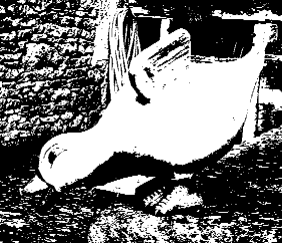
And we ate. Oh, how we ate! Each nearby town had one or two fine restaurants—admittedly some were not as fine as others, and here I am particularly thinking of the one in St. Circ run by the French equivalent of Basil Fawlty—and it was market day in one town or another every day of the week, where we obtained amazing baked goods, fresh strawberries, vibrant tomatoes, roasted chickens, walnut wine, and many other fresh and delicious things which we dragged back to our cave for later consumption. Twice a week the baker came out in his little Citroën truck to supply us with baguettes, croissants, and other necessities.
Life in the south of France is lived outdoors. The weather was clear and hot most days, inviting afternoon naps and open windows (and a few six-legged visitors). We took our meals on the porch, passing plates through the kitchen window. Hawks chased the mice that ran from tractors in the fields nearby. By night we sat in the courtyard, admiring the beelyuns of stars.
Not that our existence was entirely pastoral; we did visit some more sizeable towns, such as Cahors and Sarlat. I am well-traveled enough not to be surprised at small children speaking French, but it still struck me as odd to see young teenagers go through the standard French greeting dance: the girls kiss cheeks (generally an air-kiss, or an even more denatured pigeon-like head-bob) with girls or boys, while the boys shake hands with each other. Once this ritual is concluded they turn right back into what I would consider normal teenagers: giggling, calling each other names, and punching each other on the shoulder. In France one always shakes hands or exchanges kisses upon meeting someone for the first time each day, and never on the second or subsequent time. We even saw airport employees in safety-orange vests air-kiss on the tarmac in Toulouse. I think if you grow up in France you have hardware in your brain dedicated to remembering this particular bit of information for each person you know; foreigners have to emulate it in software, which is much less efficient and more stressful.
After a few days Ruth, Ethan, and Amy wandered off toward Paris, leaving us (not nearly as fluent as Amy but still able to smatter tolerably well) as translators for Ellen. Ellen had no French at all, and was greatly pleased when she was able to get directions and make change: "I feel so grown-up!" But any smugness I had over my language skills evaporated when I attempted to say "we're only window-shopping" and it came out more like "we're not licking anything but the storm windows."
Then fans Kate Schaefer and Glenn Hackney arrived from Seattle, giddy with jet lag and with even less French than Ellen. Instantly we became the old China hands, telling them all about the money and the bathrooms and Scary Giant Sponge Man. The next day we toured the dolmens (Neolithic standing stones and stone huts) in the woods near Prayssac, which a fellow who lives nearby assured us were "alive," unlike the "dead" stones of Stonehenge and Carnac. No one knows for sure what these ancient stone structures were originally used for, but they stand right by the road as they have for thousands of years. A pair of low, semi-ruined stone walls parallels the road for a bit; do they mark the borders of a much older road? The only information we had was a third- generation photocopy of a hand-written map from the tourist office, so we had no way of knowing.
Alas, it was time to depart. We thanked Ellen, said goodbye to Kate and Glenn, and drove back to Toulouse, where we had even more trouble reaching our motel the second time, but failed to take the hint and drove downtown for dinner. Toulouse is a substantial city, and there were ten times as many people per block (all in the streets, jaywalking) than we had seen in most entire towns during our previous week in the boonies. Thirty heart-stopping minutes of traffic later we managed to park the car, and set off on foot in search of a restaurant. Eventually we stumbled upon a place wedged into an oddly-angled slot between buildings, called La Bonne Idee (The Good Idea, an odd name for a restaurant in France), where there was a small stuffed animal on each table and we had the best meal of the entire trip. Filet mignon of pork, yum.
On the way back to the motel we got lost again, and failed twice to convince card-operated gas pumps to share their essence with us. Then we arose before dawn and made our way back home by way of Dutch motel, French roads, American rent-a-car company, French airport, German airline, and the Frankfurt airport again. This time we had a long layover, and decided to venture all the way from Boringland through Interestingland to The Real World in search of a decent meal.
I found myself, on about two hours' sleep, facing the alternatives of Irish pub or Chinese restaurant in a German train station five stories beneath the airport.
One thing's for sure, that wouldn't have happened in Cleveland.
—DDL
So there we were in the kitchen fixing dinner and listening to news on National Public Radio. "We've got the turkey, and the corn, and some fresh tomato. Do we want a starch with that?" "My philosophy has always been 'Use what you can, and burn the rest!'" said David. It took me a bit to realize he was referring to the piece about caskets on sale at Costco, and not to his plans for the turkey cutlets.
"When your only tool is a brain, all your problems start looking like problems."
—KY
"One sloth to another: 'Are you sure? I was hoping we were lust.'"
Wow, you (Kate) gave me Bento at Torcon yesterday, and I'm loccing. Never have I been so prompt. A new priority on locs on my part, and you're the first beneficiary. And maybe the last; I have a tendency to let things slide. But consider this a Harry Warner Memorial Loc. [At Torcon, Steve Stiles and Jim noted that it would take all of us together to make up for the loss of Harry, and we'd better get cracking.] Our culture makes little room for adolescents, as our houses make little room for birds. Elizabeth Bourne's analogy is good. Spiders, and other things that eat mosquitoes, are clearly the good guys. They wear white hats, which they're continually weaving. Two-letter state abbreviations... Greg Wilson's address illustrates one of their many lackvirtues. The two-letter abbreviations were to save computer disk space when that mattered. We don't have to use them. Which state is NV? North Vermont? [Don't blame computers for this one; those abbreviations were introduced by the post office in 1963, along with ZIP codes, to ease handling of paper mail. Actually, NV is North Virginia.]
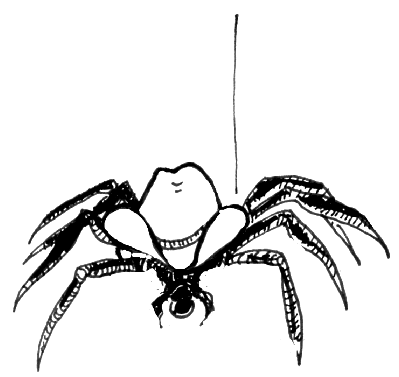
Dave Langford
ansible@cix.co.uk
15 and 22 September 2003
The byplay with the Seven Dwarfs reminded me of a round in BBC Radio's very silly quiz show "I'm Sorry, I Haven't a Clue", in which players were given an answer and invited to deduce the question. "A. Hairy, slimy, bloody, oily and smelly." "Q. Name the cast in Quentin Tarantino's Snow White?" (Correct question: "Name five adjectives ending in Y that have all been used to describe Lord Archer.")
Hazel and I liked the Cowboy Grammar, by the way, but we were both unconvinced by the Future Perfect sequence. Perhaps "Ah'm fixin' ta ha' done mosey'd" or something along those lines? [Yes, we got the grammar wrong, but your pronunciation's off: it's "Ah'm fixin' t've done mosey'd."]
Oh, and the profound insight about root beer on page 37 made me think of the blurb line which I provided for David Garnett's sf farce Bikini Planet. (He begged a quote from practically everyone in British SF, none of us being allowed to see the text.) "If science fiction's founding father H.G. Wells were able to read this astonishing book, he would be alive today."
Officer Obie went to put us on the plane, he said "Kid, I'm gonna put you on the plane, I want your wallet and your belt."
I suddenly find myself in Rhode Island, which is never a place I imagined living. For one thing, the odds are kind of against it. Falling from orbit, I'd be much more likely to hit Texas. Heck, you could drop Rhode Island into West Texas and spend weeks wandering around plaintively calling for it....
Andi Shechter
Roscoe@drizzle.com
October 7, 2003
I tell ya, one darn Hugo-like nomination and they're acting like they know what it feels like, hmph. Harumph. (Andi doing her imitation of Teresa Nielsen Hayden doing her imitation of an Old Phart, the difference being I have a real cane to bang on the floor.) Why you young whipper-snapper (can you be an old whipper- snapper?) you got years, YEARS, I sez, to feel that weirdness of getting an invite to the losers' party before you know about winning or losing. Why, hecky-poo, sure there's a Hugo on our mantelpiece, yep, by golly, but it took Stu years, years I tell ya, to win it. I think it might have been 12 or 13 losses; the year we actually thought he was gonna win he didn't, but we finally made some lovely buttons that read "It's an honor just to be nominated". And of course it is, blah, blah, blah. But we know, really, really, how David felt, how you tread a thin line between hope and reality and wondering if maybe this time.... (The losers' party really does have the better food.)
And as for "what do you do?"—Oy, tell me about it. I swear, the time this troubled me most was when I actually passed the contestant test for "Jeopardy!" and worried what they might say to me when I was introduced. This was some years after I went on disability, which leaves me still, after 10 years, dumbfounded when asked what I do.... Other cultures tend to ask different things of people to get a handle on them. Sometimes it's trying to figure out "who your people are"—clan, or family, or tribe. In Deaf Culture, I was taught that it's often asked where you attended school, since that defines social circle and people you might have in common.
Kate's investment group. Aieee! Years ago, when I worked at CIL in Berkeley, we discovered that we had on staff two people named Andi/Andy, two named Sandy/Sandie, two named Randy/Randi (I think) and a Candy. I always thought we should form a singing group and go out on the road. Each of the name pairs, by the way, had one woman, one man. I guess we gave up before trying to find a guy named Candy.
Anne Marie Merrit
San Diego CA
October 11, 2003
You know you've achieved NerdVana when you covet the address of the building next door, which has the number 11010.
Working in the technology field is a little like working for the CIA. You can't tell non-techie people what you do for a living because they'll never understand anyway. Nowadays when people ask me what I "do", I just say, "Whatever they tell me to do". If they get pushy, I launch into a more detailed version:
Usually I stare motionless into a 19" square of glowing glass for hours, transfixed. Sometimes I move my fingers slightly to press down small chiclet-sized squares, or push around a little round plastic object with my right hand. On rare occasion I'll get up to fetch a soda, retrieve a printout, or even chat with the other woman on my floor if I happen to see her in the restroom. Ironically, she does almost exactly the same things as I, but I make way more money. Hmmm... Come to think of it, the CEO does exactly the same things I do, but...
Brad Foster
bwfoster@juno.com
November 8, 2003
I am still working on freaking website, which should be up Real Soon Now....but whenever it is, I'm quite tempted to make a FAQ page just to run the questions you have on page 8. Of course, to be a legitimate web FAQ page, it must also contain the answers... maybe I'll make that multiple choice....
Loved "Observations on Adolescence"!
I thought I was the only person who had ever actually observed that traffic pile you talk about in "Under Pressure". I've always referred to it as the "Moving Traffic Knot" since I first observed it years ago while walking along the side of a highway one morning during rush hour, and had enough view up and down the highway, and time by walking, to observe the wave of red lights moving toward me, traffic stopping, then starting up, in a visibly moving wave. Very cool to see, like a page in a math text come to life.
Rick Simkin
rick.simkin@acm.org
October 9, 2003
Omygoodness I'm in Bento! So is Ariel Shattan. Is this the same woman that I drove with from Boston to Montreal and back in about 1978?
Rel says:
Yes, it is. Let's face it, how many Ariel Shattans can there be? ::stunned:: How the hell is Ricky?
[All together now: It's world of laughter, a world of tears, it's a world of hope and a.... Okay. You can stop now. Stop. Stop! I'M SORRY!!!]
John Hertz
Los Angeles, California
November 2003
Sometimes when people ask "What do you do?" I say "I answer questions." If it's my turn to ask, I am likely to say "What are you reading?"
You let the good luck run out of the horseshoes. [No, we let the BAD luck fall out of the horseshoes. You have to trust your horseshoes to be able to discriminate.]
João Augusto Matos Bento
jbento1@msn.com
26 March 2004
MY NAME IS BENTO (and of course all my family). I find very interesting your pages. I don't know exactly were the name BENTO starts but the Portuguese (like me) got in the past a lot of influence in Japan. There are a lot of names of Portuguese origin. CHÁ, for example is 'tea' in both languages. Our books mention the name BENTO start in a monastery where live a monk that everybody call him frei (monk) BENTO. I don't know but I keep search for the roots of this name. All the very best to you.
[We also heard from Ursie Bento ("a person not the lunchbox") on the same topic.]
Elizabeth M. O'Brien
Laguna Woods, CA 92637-0712
August 19, 2004
I had occasion recently to visit with Hal and Ulrika O'Brien in Seattle. One of the delights of the trip was the discovery of a stack of Bentoi, which I promptly absconded with (a temporary arrangement with a solemn vow to return them if I could get on your mailing list to receive my own—HINT, HINT.)
I especially enjoyed David's article "Under Pressure" in the most recent—not least because of the aside about Sarah, their dog. Yes indeed, she does let you know that she's there. The subject of the article has long been of pragmatic and observational interest to me, but I never had the allegory of gaseous behavior to describe it so elegantly.
Kate's article "And What Do You Do?" was equally enjoyable. "…seek chocolate,…metabolize…" A sound plan indeed!! Now that I'm retired, I find the question inane. An attempt to categorize me rather than to discover who I am. My sister has filled up her life with all of those career and office types of activities people are seeking in response to that question: member of the Board of Directors of her retirement community, member of the Board at her Temple; founder of a Friendship Club. Lots of titles, a full schedule, and little time to chat on the phone. I, on the other hand, am learning to create bobbin lace (nowhere near as portable as knitting). Once or twice a month I head for the LASFS to work at its library and catch up with fannish friends. No titles, little scheduling, and lots of time to chat with friends and neighbors.
"There's a fine line between astronomy and standing in a field looking like an idiot. A real fine line."
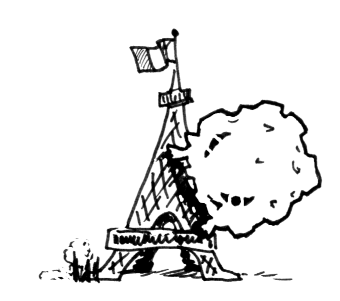
Scary Giant Sponge Man
leaves behind him
a trail of thin dark liquid
that smells like truffle wine...
Art Credits: Back cover, catfish hexapod, and white-hat spider by Ulrika O'Brien. Green Man and Bruce the bat by Sue Mason. Two guys at Uncle Sam's door by Barrie Maguire/NewsArt. Toppling the elephant by Dean Rohrer/NewsArt. Photo of Magritte le Canard by David. All the rest liberated from the World Wide Web. Viva!